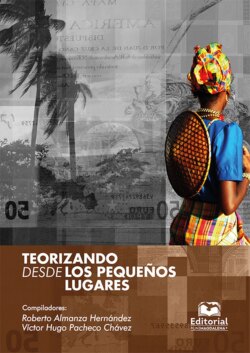Читать книгу Teorizando desde los pequeños lugares - Roberto Almanza Hernández - Страница 9
На сайте Литреса книга снята с продажи.
Referencias bibliográficas
ОглавлениеDuBois, W.E.B. (1994). The Souls of Black Folk. New York, EE. UU.: Gramercy Books.
Dussel, E. (1979). Modern Christianity in Face of the “Other” (from the ‘Rude’ Indian to the “Noble Savage”, Concilium, 130, 49-59.
Fanon, F. (2008). Black Skin, White Masks. Richard Philcox, trans. New York, EE. UU.: Grove Press.
Fischeer, S. (2004). Modernity Disavowed: Haiti and the Cultures of Slavery in the Age of Revolution. North Carolina, EE. UU.: Duke University Press.
Gordon, L. R. (2000). Existentia Africana: Understanding Africana Existential Thought. New York, EE. UU.: Routledge.
Gordon, L. R. (2006). African-American Philosophy, Race, and the Geography of Reason. En L. R. Gordon y J. A. Gordon (Eds.), Not Only the Master’s Tools: African-American Studies in Theory and Practice (pp. 3-50). Colorado, EE. UU.: Paradigm Publishers.
Gordon, L. R. (2008). An Introduction to Africana Philosophy. New York, EE.UU.: Cambridge University Press.
Greer, M. R., Mignolo, W. D. & Quilligan, M (2007). Rereading the Black Legend: The Discourses of Religious and Racial Difference in the Rennaissance Empires. Chicago, EE. UU.: University of Chicago Press.
León-Portilla, M. (1963). Aztec Thought and Culture: A Study of the Ancient Nahuatl Mind. Jack Emory Davis, trans. Oklahoma, EE. UU.: University of Oklahoma Press.
Lloyd, G. (2005) “The Man of Reason”. En Cudd, A. E. y Adreasen, R. (Eds.), Feminist Theory: A Philosophical Anthology. New Jersey, EE. UU.: Blackwell Publishing.
Maldonado-Torres, N. (2008). Against War: Views From the Underside of Modernity. North Carolina, EE. UU.: Duke University Press.
Medina, J. (2013), The Epistemology of Resistence: Gender and Racial Oppresión, Epistemic Onjustice, and Resistant Imaginations. USA: Oxford University Press.
Medina, M. y López Maya, M. (2003). Venezuela: Confrontación social y polarización política. Bogotá, Colombia: Ediciones Aurora.
Mignolo, W.D. (2012). Decolonizing Western Epistemology/Building Decoonial Epistemologies. En A. M. Isasi-Diaz, y E. Mendieta, (Eds.). Decolonizing Epistemologies: Latina/o Theology and Philosophy. New York, EE. UU.: Fordham University Press.
Monahan, M. J. (2011). The Creolizing Subject: Race, Reason, and the Politics of Purity. New York, EE. UU.: Fordham University Press.
Sheth, F. A. (2009). Toward a Political Philosophy of Race. Albany, EE. UU.: State University of New York Press.
Wynter, S. (1995). 1492: A New World View. En Haytt, V. L. y Nettleford (Eds.), Race, discourse, and the Origin of the Americas: A New World View (pp. 5-57). Washington, D.C., EE. UU.: Smithsonian Institution Press.
Wynter, S. (2001). Towards the Sociogenic Principle: Fanon, Identity, the Puzzle of Conscious Experience, and What It Is Like to Be ‘Black. En M. F. Durán-Cogan y A. Gómez-Moriana, (Eds.), National Identities and Sociopolitical Changes in Latin America, New York, EE. UU.: Routledge.
Wynter, S. (2003). Unsettling the Coloniality of Being/Power/Truth/Freedom: Toward the Human, After Man, Its Over representation – An Argument. The New Centennial Review, 3(3), 257-337.
Wynter, S. (2006). On How We Mistook the Map for the Territory, and Re-Imprisoned Ourselves in Our Unbearable Wrongness of Being, of Désêtre: Black Studies Toward the Human Project. En L. R. Gordon y J. A. Gordon (Eds.), Not Only the Master’s Tools: African-American Studies in Theory and Practice (pp. 17-169). Colorado, EE. UU.: Paradigm Publishers.
1. Enfatizo aquí en “colonial” para dejar abierta la posibilidad de que ello no solo se refiere al encuentro entre europeos y los pueblos del hemisferio occidental, tal como está planteado el problema, sino, por el contrario, se refiere también al carácter colonial mismo de este encuentro. Además, esto deja abierta la posibilidad de que los encuentros anteriores a 1492 pudieron no haber tenido el mismo carácter colonial.
2. Por supuesto, mi perspectiva aquí sobre el colonialismo hace la distinción central europeos/no europeos y aún más entre europeos, mujeres, pobres, homosexuales y discapacitados, donde todos ellos, de diferentes formas, son ejemplificaciones de este “otro humano del hombre”
3. Esto no implica que fue un proceso simple o sencillo, ni implica negar que existen reales y significativas diferencias internas al interior de Europa. Pongamos un simple ejemplo: el estatus de España como europea, desde el punto de vista de los europeos del norte, fue, siempre y de muchas maneras que aún están presentes, significativamente dudoso (véase Greer, et. al., 2007). Con ello no queremos sugerir que Europa se ha desarrollado al mismo tiempo y de una sola vez bajo una identidad monolítica libre de tensiones internas (y aun de contradicciones), sino que llama la atención por relevante que dichas diferencias internas fueran mucho menos sobresalientes fuera o al exterior de Europa.
4. En mi propio trabajo he descrito este “sentido del yo” como uno en el cual el hombre europeo se concibe a sí mismo como la más pura forma de lo humano y el colonialismo como un esfuerzo por purificar el mundo, llevándolo bajo el dominio de la más alta y la más pura manifestación de humanidad (consúltese Monahan, 2011, pp. 53-182).
5. Mi uso aquí del pronombre masculino es un reconocimiento deliberado de la manera como la mujer es concebida como constitutivamente incapaz de tal racionalidad y autonomía. Véase Lloyd (2005).
6. La manera que utilizo aquí “rebelde” se debe a Falguni Sheth en su libro Hacia una política filosófica de la raza.
7. Las fuentes asiáticas son un poco mejores, sin embargo, presentan problemas semejantes.
